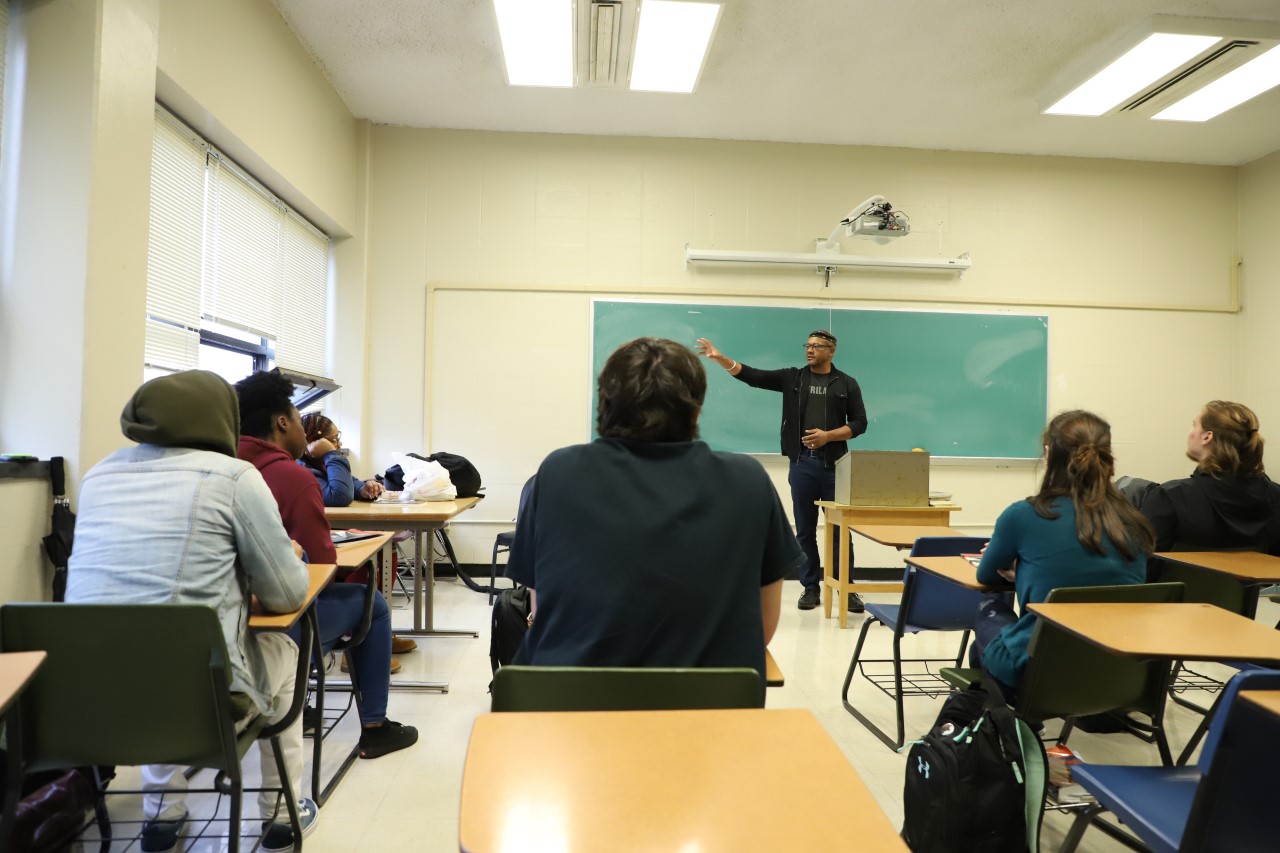Frank X Walker slides into a nondescript classroom in EKU’s Wallace building wearing a t-shirt displaying his own coined term — “Affrilachia” — with a black jacket, straight-cut blue pants and dress shoes. He’s 58 (going on 35 from his appearance), but sporting an arts resume that should have taken 100 years to compile.
In the poetry world, or even in the broader literary world, he’s a giant — eight collections of poetry and counting, thousands of copies sold, hundreds of lectures and readings given all over the world, from Cuba to California to China. And yet, on an unseasonably warm February day on a campus where he doesn’t work (anymore), where his appearance wasn’t announced or promoted, in a class named Affrilachia, he’s the guest lecturer for 15 students. It’s the equivalent of 21 Pilots putting on a secret show at the Paddy Wagon.
This is what Frank X Walker does: he inspires young people with brutal honesty about himself and his family. Of the many things he’s mastered, self-deprecation is high on the list.
“He always possesses a distinct humility that encourages everyone around him to believe that their stories, their truths, no matter how simple or complex, are valuable,” says Dr. Lisa Day, Director of Interdisciplinary Studies and Walker’s office neighbor and colleague when he taught at EKU from 2004-2006.
“I was in Washington state, on the university campus in a room with about 250 people, and we get to Q and A, and the first question is, ‘Professor, are there other black people in Kentucky?’ And I look at him like, ‘Do I look like I don’t have parents?’ And then I say, ‘I’m one of eleven… and they’re waiting for me to count all the black people in Kentucky,’” Walker says.
The story melds into something less tangible, about how the rest of the country sees the people of Appalachia, and what it gets so incredibly wrong.
“Regardless of ethnicity, socioeconomic status affects everybody in the region,” Walker says as a primer on what life is like now, and was like for him growing up. The stereotypes of the south and what Walker calls Affrilachia are backed up by media, television and general misinformation.
“People that are from the region never get connected to the region…there are so many individuals that are connected to the region that are people of color,” he says. In other words, the history of African Americans and Appalachia is one, thus … “Affrilachia.”
A native of Danville, Walker is a former high school football star who once loaded trucks over a summer and thought he might skip college. Today, he is a professor at the University of Kentucky, a former poet laureate of Kentucky, a four-time honorary doctorate recipient, a world-renowned speaker, lecturer and writer, and now the co-founder, publisher and editor of Pluck! The Journal of Affrilachian Arts and Culture.
“I’m proud to be from Danville, I’m proud to be from Kentucky,” Walker says, joking that it angers his former girlfriends that a sign outside of Danville says, “Home of Frank X Walker.”
He did not visit to lecture, as lectures generally have an outline, a topic and a sequence. A conversation is what Walker has. He comes into this diverse class, starts it with a prompt, gets a question and then starts answering it in a roundabout way which, at its essence, is storytelling. His reply to the question is background and answers wrapped up together in a 15-minute explainer where breaths are not particularly important. The words spill out like a waterfall while awed students try to soak in every drop of wisdom.
“I really enjoyed hearing him speak because it felt like we were having one big conversation, and he was very open with us,” says student Myanna Little, who spoke with Walker after class.
“Our students are quite fortunate to have been able to hold a sustained conversation with Frank X Walker,” Day says.
Walker touches on topics of family, addiction, “black people time” (and why that’s okay), and why Appalachia’s family values might be able to fix America.
Dr. Joshua Farrington teaches the Affrilachia class. “Frank X Walker has been a part of this class from its inception. When Lisa (Day) and I were developing this class in the fall, Professor Walker gave us permission to use the term Affrilachia as the course name. When I invited him to campus, I suggested that he could do a Skype interview, as I knew his speaking schedule was already quite full. He insisted on coming in person, as he wanted to make the experience special for the AFA/APP students.”
Walker did just that.
“He was very raw, very open and very humble. This easily is one of my best highlights of college,” Little says. “Being able to share your history, family history, oppressions and overcomings with people who may be perceived to be outsiders and may not understand can be difficult, but Frank made it seem easy.”
It's one of those days that students won’t forget.

